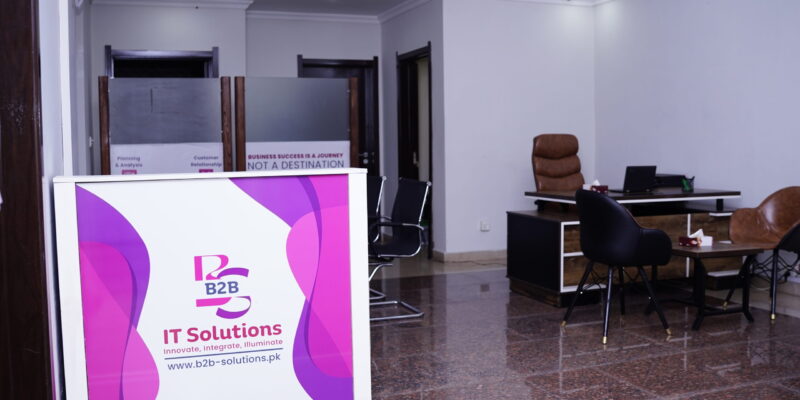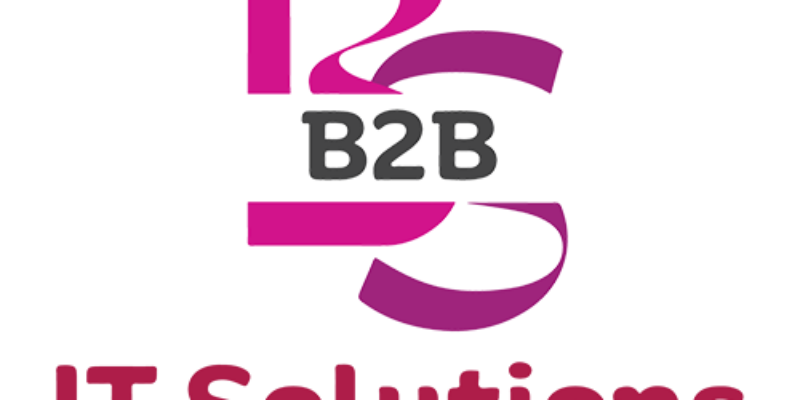- Home
- Software Houses
- B2b IT Solutions
B2b IT Solutions Claimed
Boost your business efficiency and grow your online customer base with B2B IT Solutions. We specialize in expert IT, marketing, and call center services tailored for businesses in Pakistan. Enhance your online presence, drive more traffic to your website, and generate high-quality leads to achieve your goals effectively. Let B2B IT Solutions help you streamline operations and attract the audience you deserve!
Introduction
In the digital era, businesses must leverage technology to stay competitive and drive growth. B2B IT solutions provide companies with essential tools and services, enabling them to optimize operations, enhance productivity, and secure their digital assets. From cloud computing and cybersecurity to enterprise software and managed IT services, B2B IT solutions cater to diverse business needs. This article explores various B2B IT solutions, their benefits, and how businesses can implement them effectively.
What Are B2B IT Solutions?
B2B IT (Business-to-Business Information Technology) solutions refer to IT products and services designed specifically for businesses rather than individual consumers. These solutions help organizations improve efficiency, enhance collaboration, secure data, and streamline processes. Examples of B2B IT solutions include:
- Cloud computing services
- Cybersecurity solutions
- Enterprise Resource Planning (ERP) software
- Customer Relationship Management (CRM) software
- Managed IT services
- Data analytics and business intelligence
- IT infrastructure solutions
Key B2B IT Solutions and Their Benefits
1. Cloud Computing Services
Cloud computing has revolutionized the way businesses store, process, and manage data. Cloud solutions offer scalability, flexibility, and cost-effectiveness. Popular cloud services include:
- Infrastructure as a Service (IaaS): Provides virtualized computing resources over the internet.
- Platform as a Service (PaaS): Offers a platform for developing, testing, and deploying applications.
- Software as a Service (SaaS): Delivers software applications over the internet, eliminating the need for local installation.
Benefits:
- Reduced IT infrastructure costs
- Enhanced data security and disaster recovery
- Remote accessibility and collaboration
- Automatic updates and maintenance
2. Cybersecurity Solutions
With increasing cyber threats, businesses must protect their data and IT infrastructure. B2B cybersecurity solutions include:
- Firewalls and intrusion detection systems
- Antivirus and anti-malware software
- Data encryption and secure access controls
- Security Information and Event Management (SIEM) systems
Benefits:
- Protection against cyberattacks and data breaches
- Compliance with industry regulations
- Enhanced customer trust and reputation
- Secure remote work capabilities
3. Enterprise Resource Planning (ERP) Software
ERP software integrates core business processes such as finance, HR, supply chain, and operations into a single system. Leading ERP solutions include SAP, Oracle NetSuite, and Microsoft Dynamics.
Benefits:
- Centralized data management
- Improved efficiency and productivity
- Real-time reporting and analytics
- Better resource planning and allocation
4. Customer Relationship Management (CRM) Software
CRM software helps businesses manage customer interactions, sales, and marketing efforts. Popular CRM platforms include Salesforce, HubSpot, and Zoho CRM.
Benefits:
- Enhanced customer engagement and satisfaction
- Automated sales and marketing processes
- Data-driven decision-making
- Improved sales forecasting
5. Managed IT Services
Managed IT services allow businesses to outsource their IT needs to specialized providers. Services include IT support, network management, and data backup solutions.
Benefits:
- Reduced IT costs
- 24/7 monitoring and support
- Proactive issue resolution
- Enhanced security and compliance
6. Data Analytics and Business Intelligence
Data analytics solutions help businesses extract insights from their data to improve decision-making. Tools like Tableau, Power BI, and Google Analytics enable businesses to analyze trends, monitor performance, and optimize strategies.
Benefits:
- Data-driven decision-making
- Improved operational efficiency
- Enhanced customer insights
- Competitive advantage in the market
7. IT Infrastructure Solutions
IT infrastructure includes hardware, software, networks, and data centers that support business operations. Solutions include on-premises infrastructure, cloud-based solutions, and hybrid models.
Benefits:
- Reliable and scalable IT environment
- Enhanced system performance
- Secure and efficient data management
- Reduced downtime and operational disruptions
Implementing B2B IT Solutions Effectively
To maximize the benefits of B2B IT solutions, businesses should follow a structured implementation approach:
1. Assess Business Needs
Identify key business challenges and IT requirements. Conduct an IT audit to evaluate existing infrastructure and processes.
2. Choose the Right Solutions
Select IT solutions that align with business goals, industry requirements, and budget constraints.
3. Partner with Reliable IT Providers
Work with reputable IT service providers to ensure quality solutions, reliable support, and security compliance.
4. Plan for Integration and Training
Ensure seamless integration with existing systems. Train employees to use new IT solutions effectively.
5. Monitor and Optimize
Continuously monitor IT systems, analyze performance, and implement improvements based on insights and feedback.
Future Trends in B2B IT Solutions
1. Artificial Intelligence and Automation
AI-powered solutions are transforming business operations with intelligent automation, predictive analytics, and personalized customer experiences.
2. Blockchain for Business Security
Blockchain technology enhances data security, transparency, and trust in B2B transactions and supply chains.
3. 5G and Edge Computing
Faster and more reliable connectivity with 5G and edge computing will improve real-time data processing and remote collaboration.
4. Internet of Things (IoT) for Smart Operations
IoT devices enable real-time monitoring, predictive maintenance, and enhanced efficiency in industries such as manufacturing, logistics, and healthcare.
Conclusion
B2B IT solutions are essential for modern businesses seeking to improve efficiency, security, and innovation. By leveraging cloud computing, cybersecurity, ERP, CRM, managed IT services, data analytics, and IT infrastructure solutions, businesses can gain a competitive edge. As technology continues to evolve, companies must stay ahead by adopting emerging trends like AI, blockchain, and IoT. Investing in the right IT solutions ensures long-term growth, enhanced productivity, and a secure digital future.
Rate us and Write a Review
Your request has been submitted successfully.
top packers and movers in Islamabad
Top Packers and Movers Islamabad offers compr.
17 April, 2025 No CommentsHEC – LAW ADMISSION TEST 16 MARCH
[caption id="attachment_15653" align="alignce.
5 March, 2025 No Comments



